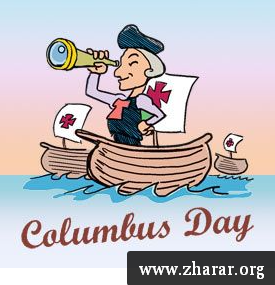Columbus Day

Columbus Day is a national holiday in many countries of the Americas and elsewhere, and a federal holiday in the United States, which officially celebrates the anniversary of Christopher Columbus's arrival in the Americas. He went ashore at Guanahaní, an island in the Bahamas, on October 12, 1492. On his return in 1493, he moved his coastal base of operations 110 kilometres (70 mi) east to the island of Hispaniola, in what is now the Dominican Republic and established the settlement of La Isabela, the first permanent Spanish settlement in the Americas.
Christopher Columbus (Italian: Cristoforo Colombo [kriˈstɔːforo koˈlombo]) was an Italian explorer from Genoa who led a Spanish maritime expedition to cross the Atlantic Ocean in search of an alternative route to the Far East. Columbus believed he sailed his crew to the East Indies, but Europeans realized years later that his voyages landed them in the New World. His first voyage to the New World was made on the Spanish ships Niña, Pinta, and Santa María and took about three months. The crew's arrival in the New World initiated the colonization of the Americas by Spain, followed in the ensuing centuries by other European powers, as well as the transfer of plants, animals, culture, human populations, and technology between the New and Old Worlds, an event referred to by some late 20th‐century historians as the Columbian exchange.
Christopher Columbus (Italian: Cristoforo Colombo [kriˈstɔːforo koˈlombo]) was an Italian explorer from Genoa who led a Spanish maritime expedition to cross the Atlantic Ocean in search of an alternative route to the Far East. Columbus believed he sailed his crew to the East Indies, but Europeans realized years later that his voyages landed them in the New World. His first voyage to the New World was made on the Spanish ships Niña, Pinta, and Santa María and took about three months. The crew's arrival in the New World initiated the colonization of the Americas by Spain, followed in the ensuing centuries by other European powers, as well as the transfer of plants, animals, culture, human populations, and technology between the New and Old Worlds, an event referred to by some late 20th‐century historians as the Columbian exchange.
| |
|
|
|
|
|
|
